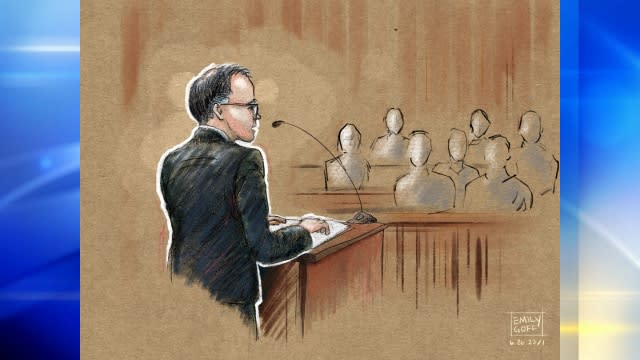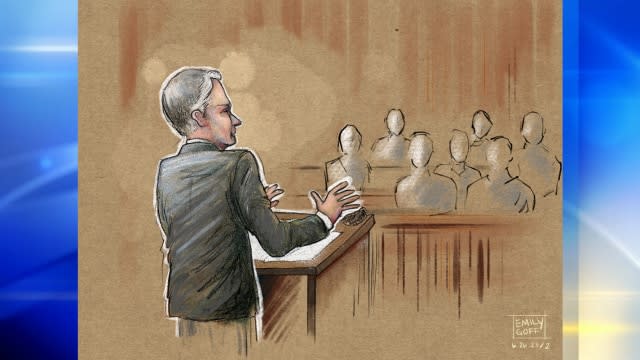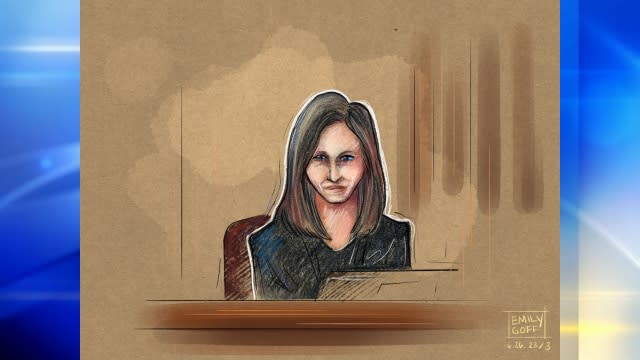Penalty phase begins in trial of Robert Bowers, convicted of killing 11 at Pittsburgh synagogue
The penalty phase began Monday in the trial against Robert Bowers, the man convicted of killing 11 people inside a Squirrel Hill synagogue in 2018.
PITTSBURGH SYNAGOGUE SHOOTING TRIAL: FULL COVERAGE ⇒
Jurors must now decide whether the 50-year-old should be sent to death row or sentenced to life in prison without parole.
The defense requested to split it into two elements with the first being the eligibility phase.
The prosecution will have to prove that Bowers had the intent to commit hate crimes while the defense will use his mental capacity as a reason why he isn’t eligible for a punishment of death, Robin Maher, executive director of the Death Penalty Information Center told Channel 11.
“I assume the defense will present some evidence of mental health and brain impairment since that’s the information we’ve seen in the proceedings and argue that Bowers didn’t have the intent because of his severe mental illness,” Maher said.
>>> Tree of Life, community react to guilty verdict in Pittsburgh synagogue shooting trial
If you or someone you know is experiencing mental health effects from the trial, go to 1027healingpartnership.org to find help resources. As always, call 911 to report threats.
Phone: 412-697-3534
Prosecution opening arguments
There were powerful opening statements from the prosecution as they read the names of the 11 victims and showed photos of every one of them.
Prosecutors say Bowers acted with clear intent and that his goal was to kill all Jews. They say Bowers deserves the death penalty.
“He decided to go back inside and kill more people, people who were hiding under pews. He came to kill and each decision he made shows his intent,” prosecutor Troy Rivetti told the jury.
Bowers, flipping through papers, gave little indication that he was listening to the lawyers’ statements. He has shown little reaction throughout the trial.
His own defense said this was a planned attack, Rivetti said.
Rivetti told the jurors that they found him guilty of 22 counts that carry the death penalty and that they had to consider whether Bowers acted intentionally.
Rivetti said Bowers had a “cool mind, capable of reflection.”
It’s undisputed that the victims that day experienced horror and that Bowers caused many deaths, loss and devastation, Rivetti said.
Rivetti told the jury that many of Bowers’ victims were frail and elderly. He displayed a photo of a cane left on a pew by Bernice Simon, who was shot and killed as she attempted to tend to her mortally wounded husband, both in their 80s.
There are three issues to decide, Rivetti said. First, that the defendant is at least 18 years old. Second, if he acted with intent. Third, if the government proved an aggravating factor.
Rivetti said all of the evidence from the guilt phase carries over to this phase and establishes proof beyond a reasonable doubt.
First, he said Bowers’ age is not in dispute.

Second, Rivetti addressed the level of intent and how the law provides four types of intent. He said Bowers took out his guns and intentionally shot and killed the victims and that he methodically moved from room to room, finding and killing victims. He said Bowers decided to go back and kill more people who were hiding under pews.
Bowers pulled the trigger again and again, shooting Officer Matson, Rivetti said, and only surrendered when he ran out of ammunition and was injured.
If the defense presents mental health evidence, you will be required to evaluate the believability of that evidence, he told jurors. Does it make sense with all the other evidence you’ve heard, he asked.
Rivelli said the prosecution won’t present a lot more evidence, but they will show that Bowers put people at grave risk of death, that he planned and premeditated and that Bowers’ victims were vulnerable.
Bowers shot at every person he saw, Rivelli said.
The rule of law applies here, he said. There’s a clear line and this defendant crossed it.
Defense opening arguments
Robert Bowers has had a psychotic condition since childhood, as well as serious brain defects and a history of suicide attempts, defense lawyer Michael Burt said on the opening day of the penalty phase of Bowers’ federal trial.
Medical tests found Bowers’ brain to be “structurally deficient,” with symptoms of epilepsy and schizophrenia, Burt said.
He said medical experts who examined Bowers will testify that caused irrational and delusional beliefs that led to the shooting.
And they say because of that, he should not face the death penalty.

Testimony
Relatives of several victims gave poignant testimony about their loved ones’ frailties, such as difficulty walking, hearing or a lack of situational awareness, as evidence to bolster the case that Bowers targeted the vulnerable — a potential aggravating factor.
Cecil and David Rosenthal, known as the boys, were born with a genetic disorder that causes intellectual disabilities, their sister Diane Rosenthal testified today.
She said they functioned at the level of a 3- to 4-year-old.

They couldn’t read or write, but every Saturday morning she said they looked forward to going to Tree of Life for prayer.
“They loved the people. They felt comfortable there. They weren’t judged. That was their safe place. That’s where they wanted to be,” said Diane Rosenthal.
Rosenthal was one of a handful of family members who testified as prosecutors attempted to show the vulnerability of the victims in an effort to convince jurors to consider the death penalty.
Adding to the seriousness of the murders, prosecutors said, Bowers intended to kill every SWAT officer, including Jeff Garris, who testified he was with two officers who were wounded during the shootout with Bowers.
Garris was not injured and testified that weighs heavily on him.
“The amount of gunfire heard in and around me. I’m amazed I was not hit. And I question how more of us were not,” he said.
The Associated Press contributed to this story.
Download the FREE WPXI News app for breaking news alerts.
Follow Channel 11 News on Facebook and Twitter. | Watch WPXI NOW
TRENDING NOW:
Person fatally shot while riding bike in Pittsburgh’s North Side Man dead after vehicle crashes over hillside in Pittsburgh 2 women dead after shooting in Beaver County, suspect identified VIDEO: 2 people shot in Homewood South bar parking lot DOWNLOAD the Channel 11 News app for breaking news alerts

